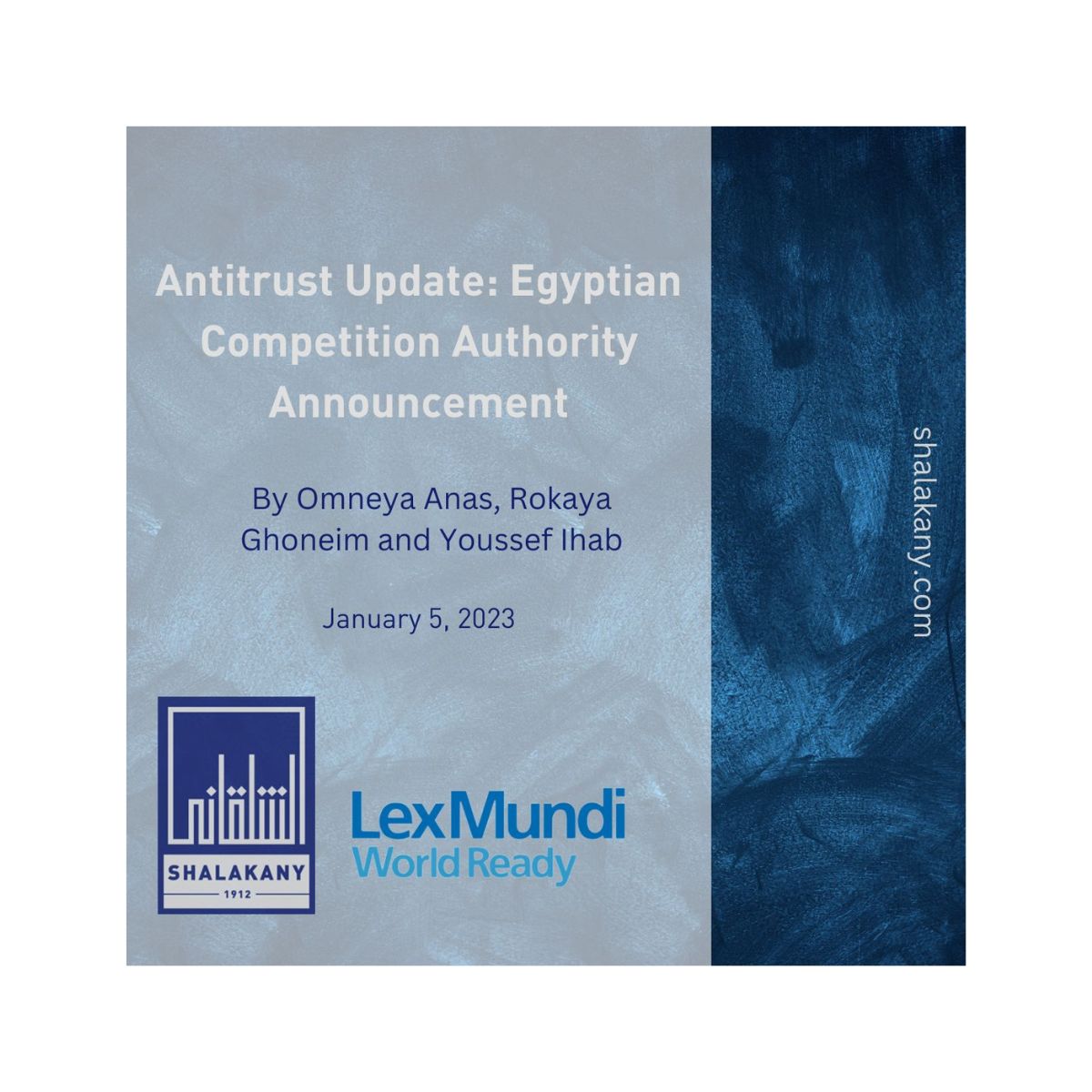
June 19, 2022
New Decree Regarding Collective Labor Negotiations
On 18 April 2022, the Ministry of Manpower issued decree No. 50 for 2022 (the “Decree”) regulating collective negotiations in many aspects, including its levels, topics, and procedures.
Workers have a freedom of representation under Egyptian law. Collective labor bargaining is a right guaranteed by the law to employees.
Collective negotiations in general are regulated by the provisions of Labor Law No. 12 for 2003 (the “Labor Law”). The procedures and levels of collective negotiations are also further regulated by decree No. 124 for 2003. However, the new Decree introduces more clarifications with respect to the levels of collective negotiations. Collective negotiations can be explained as the negotiations taking place between an employer or a group of employers, and the employees through their unions/organizations to improve the work conditions of employment and to settle employment disputes between employers and employees.
Below are the key highlights of the Decree.
Scope of Application
The Decree has a wide scope of application, including all employees, including the employees of the private sector, public sector, public works sector, investment sector, common sector and the employees of the public utilities that are not employed in the State administration.
That being said, the scope of the Decree does not cover the personnel of the armed forces and the police.
Levels of and Parties to Collective Negotiations
According to the Decree, collective negotiations shall take place in establishments with more than 50 workers between representatives of the Union Committee, the General Union and the employer. If there is no Union Committee in the establishment, the negotiations take place between the employer and five workers to be chosen by the relevant General Union, three of which must be from the establishment’s workers. If the establishment has less than 50 workers, negotiations take place between representatives of the relevant General Union and representatives of the employer.
It is important to note that, if a party refuses to begin collective negotiations, the other party may request from the competent administrative authority to notify the relevant Union Organization or the employers’ association, as the case may be, to begin the negotiations on behalf of the party refusing to negotiate.
It is to be noted that there must be at least 50 employees to form a union committee inside an establishment and at least 10 union committees, representing at least 15,000 employees to form a General Union.
The Decree further elaborates and clarifies the levels of collective negotiations, which may be undertaken on five levels (in ascending order) as follows:
Negotiation Topics
The Decree provides a very wide spectrum of negotiable topics, which includes all topics that may (i) improve the work conditions of the employees; (ii) allow the cooperation of the employer and the employees to achieve social development for the employees of the establishment; and (iii) settle the disputes arising between the employer and the employees.
Outcome of Collective Negotiations
It is important to note that during the collective negotiations phase, the employer is prohibited from issuing any decision related to the matters subject the negotiations except in the case of urgency and provided such decision will be on a temporary basis.
After the phase of the collective negotiations, the Collective Negotiations Agreement is drafted which is a legal document between an employer and a union representing the employees documenting the terms agreed upon by both parties in the phase of the collective negotiations.
If the collective negotiations did not result in an agreement, either party may resort to the competent authority at the Ministry of Manpower or the Manpower Directorates to try to reconcile the situation and assist the parties to reach an agreement.
Market Reaction
The exercise of collective negotiations provides opportunities for constructive rather than confrontational dialogue between the employers and the employees as it offers a more flexible and adequate solution than the laws and regulations in force, and this harnesses energy to focus on solutions that result in benefits to the establishment, its stakeholders, and society at large.
That being said, the Decree, and despite not adding much to the Labor Law, is a preliminary step for the regulation of collective negotiations, that needs to be implemented with maximum efficiency in practice by the employees, employers, Unions and General Unions.
Workers have a freedom of representation under Egyptian law. Collective labor bargaining is a right guaranteed by the law to employees.
Collective negotiations in general are regulated by the provisions of Labor Law No. 12 for 2003 (the “Labor Law”). The procedures and levels of collective negotiations are also further regulated by decree No. 124 for 2003. However, the new Decree introduces more clarifications with respect to the levels of collective negotiations. Collective negotiations can be explained as the negotiations taking place between an employer or a group of employers, and the employees through their unions/organizations to improve the work conditions of employment and to settle employment disputes between employers and employees.
Below are the key highlights of the Decree.
Scope of Application
The Decree has a wide scope of application, including all employees, including the employees of the private sector, public sector, public works sector, investment sector, common sector and the employees of the public utilities that are not employed in the State administration.
That being said, the scope of the Decree does not cover the personnel of the armed forces and the police.
Levels of and Parties to Collective Negotiations
According to the Decree, collective negotiations shall take place in establishments with more than 50 workers between representatives of the Union Committee, the General Union and the employer. If there is no Union Committee in the establishment, the negotiations take place between the employer and five workers to be chosen by the relevant General Union, three of which must be from the establishment’s workers. If the establishment has less than 50 workers, negotiations take place between representatives of the relevant General Union and representatives of the employer.
It is important to note that, if a party refuses to begin collective negotiations, the other party may request from the competent administrative authority to notify the relevant Union Organization or the employers’ association, as the case may be, to begin the negotiations on behalf of the party refusing to negotiate.
It is to be noted that there must be at least 50 employees to form a union committee inside an establishment and at least 10 union committees, representing at least 15,000 employees to form a General Union.
The Decree further elaborates and clarifies the levels of collective negotiations, which may be undertaken on five levels (in ascending order) as follows:
- Establishment Level: between the Union Committee (as defined above), and the employer.
- Establishment with Multi Branch Level: between the competent union organization, and the representatives of the headquarters of the establishment on behalf of the employer.
- Industry Level: between the representatives of the General Union of the Industry, and the employers undertaking activity in the same industry.
- Regional Level: between the representatives of the employers undertaking activity in the same industry in the same geographical scope and the representatives of the relevant union organization.
- National Level: between the competent General Union and the relevant employers’ organization.
Negotiation Topics
The Decree provides a very wide spectrum of negotiable topics, which includes all topics that may (i) improve the work conditions of the employees; (ii) allow the cooperation of the employer and the employees to achieve social development for the employees of the establishment; and (iii) settle the disputes arising between the employer and the employees.
Outcome of Collective Negotiations
It is important to note that during the collective negotiations phase, the employer is prohibited from issuing any decision related to the matters subject the negotiations except in the case of urgency and provided such decision will be on a temporary basis.
After the phase of the collective negotiations, the Collective Negotiations Agreement is drafted which is a legal document between an employer and a union representing the employees documenting the terms agreed upon by both parties in the phase of the collective negotiations.
If the collective negotiations did not result in an agreement, either party may resort to the competent authority at the Ministry of Manpower or the Manpower Directorates to try to reconcile the situation and assist the parties to reach an agreement.
Market Reaction
The exercise of collective negotiations provides opportunities for constructive rather than confrontational dialogue between the employers and the employees as it offers a more flexible and adequate solution than the laws and regulations in force, and this harnesses energy to focus on solutions that result in benefits to the establishment, its stakeholders, and society at large.
That being said, the Decree, and despite not adding much to the Labor Law, is a preliminary step for the regulation of collective negotiations, that needs to be implemented with maximum efficiency in practice by the employees, employers, Unions and General Unions.



